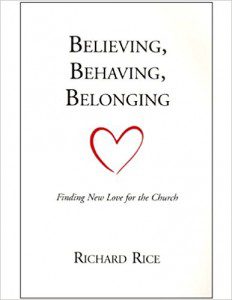 The Pew Study of religious belief in former Communist countries that we blogged about recently cites a scholar who breaks down religious involvement into three factors: “Believing. Behaving. Belonging.”
The Pew Study of religious belief in former Communist countries that we blogged about recently cites a scholar who breaks down religious involvement into three factors: “Believing. Behaving. Belonging.”
A religion entails believing in certain things. “Behaving” refers not so much to moral behavior–though acting in accord with what one’s religion teachers is surely an important factor–but to religious behavior, such as attending church, praying, etc. “Belonging” refers to membership in a religious community, as in belonging to a church and holding to a particular religious identity.
The major insight from this breakdown is that people around the world often approach their religion in at least one of these ways, but not always in all three of them.
In the former Communist countries, people “believe” and “belong,” but they do not “behave.” That is, they affirm Christian teachings and consider membership in a church extremely important, but they hardly ever actually go to church or practice other religious “behavior.”
In Scandinavia, as I have been learning, despite the presence of intensely Christian individuals who do all three, the majority of people do not “believe” (the rates of atheism and agnosticism are very high), nor do they “behave” (seldom attending religious services). But they do “belong,” as rates of church membership–church tax and all–remains very high.
In East Asian Buddhism, many people do not believe in their religion, nor do they belong to a religious community. But they do “behave” in accord with the religion, going to the temple and performing the rituals and sacrifices.
Many Americans “believe” but neither “belong” to a church nor “behave” by attending one.
Liberal Christians “belong” and “behave” in their mainline denominations without actually “believing.”
Some say that these can be put into an order according to which people can be drawn into the church, though opinions differ on what the order is. Might “belonging” eventually lead to “belief”? Or does “belief” lead to “belonging”? (See Roger Olsen’s discussion.)
What are some other applications? How can this breakdown help us in reaching the “unchurched” and in discipling the “churched”? Or is this merely a sociological account of religion that has little to do with actual faith?
From Religious Belief and National Belonging in Central and Eastern Europe | Pew Research Center:
Around the world, different ways of being religious
Believing. Behaving. Belonging.
Three words, three distinct ways in which people connect (or don’t) to religion: Do they believe in a higher power? Do they pray and perform rituals? Do they feel part of a congregation, spiritual community or religious group?
Research suggests that many people around the world engage with religion in at least one of these ways, but not necessarily all three.
Christians in Western Europe, for example, have been described as “believing without belonging,” a phrase coined by sociologist Grace Davie in her 1994 religious profile of Great Britain, where, she noted, widespread belief in God coexists with largely empty churches and low participation in religious institutions.1
In East Asia, there is a different paradigm, one that might be called “behaving without believing or belonging.” According to a major ethnography conducted last decade, for example, many people in China neither believe in a higher power nor identify with any particular religious faith, yet nevertheless go to Buddhist or Confucian temples to make offerings and partake in religious rituals.2
Many Central and Eastern Europeans, on the other hand, might be described as “believing and belonging, without behaving.” While Pew Research Center’s survey shows that majorities of adults across the region believe in God and identify with Orthodox Christianity, conventional measures of Christian religious behavior – such as levels of daily prayer and weekly worship attendance – are relatively low.















